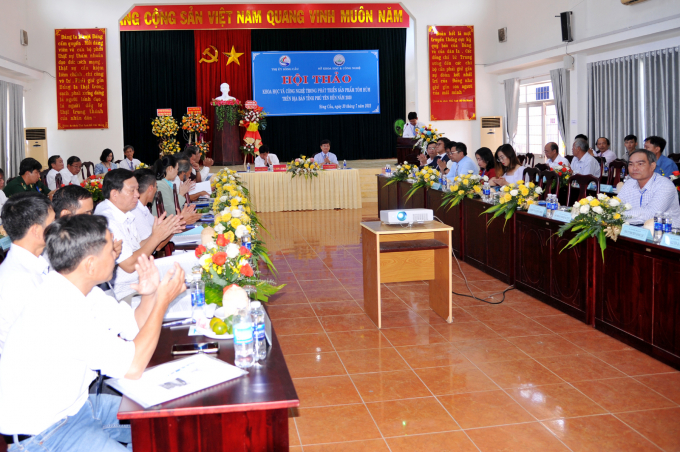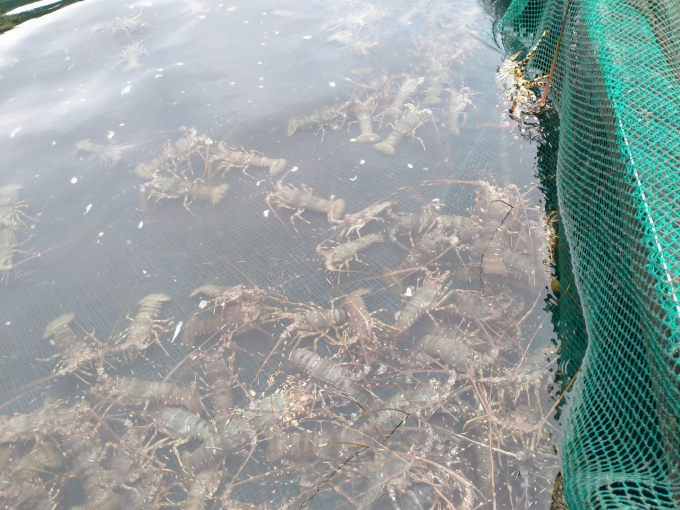November 27, 2025 | 09:37 GMT +7
November 27, 2025 | 09:37 GMT +7
Hotline: 0913.378.918
November 27, 2025 | 09:37 GMT +7
Hotline: 0913.378.918
On the afternoon of July 30, the Party Committee of Song Cau Town and the Department of Science and Technology of Phu Yen province jointly held a seminar on sustainable lobster aquaculture development in Phu Yen until 2030.

Song Cau town is considered the capital of lobster farming in Phu Yen province.
Secretary of the Party Committee of Song Cau town Do Thai Phong said Phu Yen province in general and Song Cau town in particular has a favorable geographical position for the development of lobster farming. In recent years, lobster aquaculture has become a spearhead economic sector, having great contribution to local social-economic development, creating stable jobs and increasing income for the majority of people in the province.
Currently, there are about 4,850 households involved in aquaculture farming in Song Cau town with 58,695 cages of commercial lobsters. The output reached 1,050 tons in 2021. However, lobster farming has been facing broad range of problems in terms of shrimp seed management, feed management and aquaculture zoning. Particularly, lobster aquaculture is always vulnerable to natural disasters, disease outbreaks and environmental pollution. In addition, the consumption of lobster remains depending much on unofficial export channels.

High density of lobster sea cages in Song Cau town.
At the seminar, the participants paid attention to a wide range of issues including aquaculture zoning, shrimp seed development, especially artificial breeding methods; lobster farming technologies; feed manufacturing; harvesting, preserving and processing; commercializing lobsters; responsibility of managers and local authorities.
Accordingly, the Department of Agriculture and Rural Development of Phu Ye province made a master plan on aquaculture development until 2025 with 1,000 hectares of cage culture in coastal lagoon and bay area in Song Cau town and 650 hectares of sea surface in Tuy An district which are qualified for large-scale marine farming. Under the plan, the total number of cages is 49,000 including 16,100 cages in Tuy An district and 32,900 ones in Song Cau town which raise and nurse lobsters as well as farm seaweed, snails and oysters.

To achieve sustainable lobster aquaculture development, a lot of existing problems need to be solved.
Director of the Department of Science and Technology of Phu Yen province Duong Binh Phu said to increase value as well as to create an environment for sustainable aquaculture development and to turn lobsters into a key product of the province, contributing to local social-economic development, a series of problems from zoning, management, production organization, seed supply, farming, processing to lobster consumption, and traceability need to be solved. Besides, the introduction of scientific and technological solutions to make lobster products become Phu Yen's key commodity is crucially important.
At the seminar, scientists and managers also gave speeches on sustainable lobster farming including: Applying and suggesting scientific and technological solutions to selecting, producing and supplying lobster varieties in the province; Scientific and technological solutions for sustainable lobster aquaculture development in PhuYen; Industrial-scale marine farming in float HDPE cages, a new approach to adapt to climate change; Actual state of feed manufacturing for lobster aquaculture and solutions; Actual state and orientations for sustainable development of lobster and fish farming in Phu Yen; Scientific and technological solutions to the application of green materials in lobster aquaculture.
Translated by Mai Tham

(VAN) Le Hoai Trung, Member of the Communist Party of Vietnam Central Committee and Minister of Foreign Affairs, held talks with Vi Thao, Chairman of the Guangxi Zhuang Autonomous Region (China) this week.

(VAN) The Mekong River Commission adopts the 2026 - 2030 Strategic Plan with a people-centered approach.
/2025/11/26/1720-1-200855_132.jpg)
(VAN) Viet Nam and Japan have many conditions to expand cooperation on climate change adaptation, particularly in disaster risk management based on advanced technologies.

(VAN) The strong development of digital technology and artificial intelligence is opening up opportunities to transform science and technology into a 'Magic eye' for disaster forecasting and early warning.

Applying vaccines and proactive disease prevention helps pig herds stay healthy, maintain productivity, reduce risks, and decrease reliance on antibiotics in modern livestock farming.

(VAN) Many advanced agricultural technologies and products were shared at the Viet Nam - South Korea Agricultural Technology Introduction, Trade Promotion, and Connection Seminar 2025.

(VAN) Minister Tran Duc Thang hopes to strengthen connections and exchanges with China in agriculture and environment sector through the Embassy of Vietnam in Beijing.